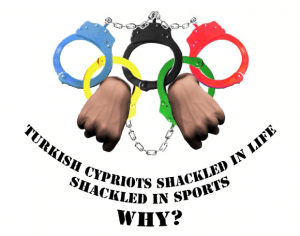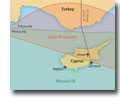 Monday 9th July 2012: The British Turkish Cypriot Association and Southwark Turkish Cypriot Association will be issuing the attached letter to Lord Moynihan, Chairman of the British Olympics Association, ahead of the start of the London 2012 Olympic Games.
Monday 9th July 2012: The British Turkish Cypriot Association and Southwark Turkish Cypriot Association will be issuing the attached letter to Lord Moynihan, Chairman of the British Olympics Association, ahead of the start of the London 2012 Olympic Games.
British Turkish Cypriot Association Chairman, Cetin Ramadan, said in a letter to Lord Moynihan: Many British Turkish Cypriots have expressed their dismay, sadness and disappointment at the exclusion of Turkish Cypriot athletes in the forthcoming London Olympic Games. As the British Turkish Cypriot Association, we have been called upon to channel their heartfelt grievances and request a reason why the International Olympic Committee (IOC) cannot accept Turkish Cypriots participating under the Olympic flag. Regardless of the political circumstances in Cyprus, this should not be used as a reason to bar Turkish Cypriots from sport. We cannot understand why the IOC has denied participation of Turkish Cypriot athletes in the London 2012 Olympic Games especially as they are willing to compete as individual athletes under the Olympic flag, similar to other athletes from countries such as Kuwait, Syria, Iran and Kosovo. Any world class athlete would consider it an honour to represent their own nation and to compete under the colours of their national flag. The Turkish Cypriot athletes are no exception; they too want to represent their own people and the Turkish Republic of Northern Cyprus. However, the Turkish Cypriot athletes have put aside the politics and compromised their own flag and country by agreeing to participate under the Olympic flag as a positive way forward.
The former President of the IOC, the late Juan Antonio Samaranch, had made an offer to Turkish Cypriots allowing them to participate in all future Olympic Games under the Olympic flag. Turkish Cypriots are willing to accept participation under the terms laid out by the former IOC President and to join the Games under the Olympic flag as individuals rather than under their own national flag. We cannot comprehend what has changed since the IOC’s original invitation and why the current President Mr. Jacques Rogge is not entering into dialogue with the Turkish Cypriot sportsmen and women who have already submitted an application for participation in the London 2012 Games.
Despite this clear example of the benefits of inclusion, many sporting bodies such as the UK FA, IOC and FIFA, which openly promote inclusion for everyone and denounce political discrimination, seem to conveniently ignore their own rules when it comes to the sporting rights of Turkish Cypriots sportsmen and women. Point 4 of the IOC’s Fundamental Principles of Olympism states that:
“The practice of sport is a human right. Every individual must have the possibility of practising sport, without discrimination of any kind and in the Olympic spirit, which requires mutual understanding with a spirit of friendship, solidarity and fair play.”
Furthermore, item 6 points out that:
“Any form of discrimination with regard to a country or a person on grounds of race, religion, politics, gender or otherwise is incompatible with belonging to the Olympic Movement.”
Are Turkish Cypriot athletes an exception to these principles? The British Olympic Association (BOA) openly promotes inclusion for everyone and they clearly denounce political discrimination. We hope the same principle applies for the sporting rights of Turkish Cypriot athletes from Northern Cyprus. Young Turkish Cypriot athletes also have the same aspirations as all top class world athletes. We are asking the BOA to support the inclusion of Turkish Cypriot athletes in these and future Olympic events. Furthermore, we would like to appeal to the BOA to raise this matter with the IOC as a matter of urgency. We believe that the discrimination of this magnitude represents a particularly vicious form of unreason and fear in the search for a UN sponsored political agreement in Cyprus. We believe it is precisely the mission of the IOC to dispel any such future actions by setting an example of the importance of diversity at a European and global platform. We have raised this subject with other ethnic community groups in both the UK and abroad particularly interested in observing the outcome of an official complaint against the IOC and hope that they will resolve the issue promptly and fairly and within accordance of the above mentioned principles. There are thousands of Turkish Cypriots living in the UK who are finding it difficult to embrace the 2012 London Games in the same manner as other nationals of ethnic origin, simply because our brethren are being excluded. Help us to change this absurd and unjust situation by supporting the inclusion of Turkish Cypriot athletes in these and future Olympic events.




